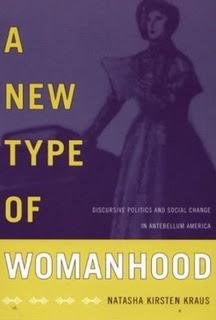A New Type of Womanhood: Discursive Politics and Social Change in Antebellum America

Kraus has done an amazing job of researching and organizing this work, which compiles so much information about American antebellum women’s rights. As I read it, I was continuously blown away by the tightness of the presentation. The author acknowledges missing records and the reality that the reader is in the present, 150 years removed from this history.
Written for university level consumption, this text explores activism at a time when the south and north were heading towards civil war. Concurrent with the fight to abolish slavery, women were utilizing public speaking, writing, and petitions to end their status as mere property and assert contractual control over their own property. The long road that spans from handing over all of their possessions, including their bodies, to their husbands to gaining equal rights is a never ending one. Women like Susan B. Anthony used the argument that women needed the same rights as men in order to benefit men and their male children.
In 1860, under the Earnings Act, married women were finally given some control over their own earnings; however, their husbands had to provide consent for those decisions. This early wave of activism happened because of what Kraus refers to as an "aporia"—an impasse in the complex web of economic, legal, and domestic interactions, among others.
Activism happens when there are ruptures in society. Kraus provides an overview of the transition from a feudal land-based economy to an industrial capitalist economy and reminds us that change is akin to difficult growth spurts. As we step into globalization, we observe the same employment fluctuations that happened during and after the Civil War.
Sadly, women are still not viewed or treated as equally important and valued as men today. Reading example after example of misogyny in the antebellum legal machine, I was angered by how far we still have to go. Discovering that in 2006 most states still provided loopholes for husbands who raped their wives helped to explain why I still cannot walk down the streets in my city without being harassed by men who refuse to take “no” for an answer. It also reveals the context of judges who hand down lenient sentences to men who beat their wives; society needs to view all people as individuals, not property.
The book ends on the conclusion that, however slowly, activists are tearing down old belief systems that oppress people. It is hopeful that in the future, democracy for all individuals in society will hopefully be achieved.